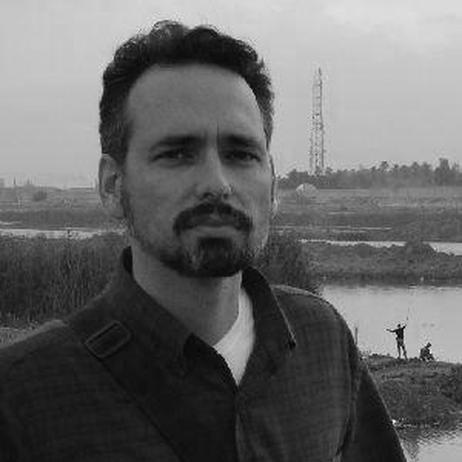BOB GARFIELD: This is On the Media. I'm Bob Garfield. As we just heard from filmmaker Dan Krauss, moral injury is one thing veterans can bring back with them in the sometimes uncomfortable adaptation back to civilian life. Indeed, such anguishing burdens, yielding tales of alcoholism, post-traumatic stress disorder and crushing boredom have become fixtures, if not quite clichés, of reporting on vets. Reporter Quil Lawrence naturally covers those issues on NPR's one-year-old Veterans Beat. But having himself been deployed for many years in Afghanistan and Iraq as a war correspondent, Lawrence believed he owed vets a more dimensionalized portrayal. Thus, he has fought his own assumptions and conventional wisdom to seek stories with unexpected conclusions, such as when he went to the UK Paralympics last summer.
QUIL LAWRENCE: I went over to London with this preconceived story in my head about, you know, American veterans knocking up competition a notch, and I found out that no one needs to teach Paralympians about competition. And the vets, they fit right in as really competitive guys. We ended up following this Navy unexploded ordinance operator who'd been blinded in a bomb blast in Afghanistan.
NAVY MAN: One of the harder aspects of, of my injury was not necessarily the physical detriment but it’s the idea that I got benched. I was on an assault team doing operations in Afghanistan and then [SNAPS FINGERS] in a snap of a finger I was benched, and I wasn’t able to be with my team anymore. But to be able to go back out and throw on this uniform, wear my flag on my sleeve and, and compete for Team USA – I used the term earlier, get back into the fight.
QUIL LAWRENCE: He was an extremely competitive guy, was swimming several events on the anniversary of his injury in Afghanistan, but all of these other Paralympians were every bit as competitive. And so that was a surprising story, as well.
BOB GARFIELD: You did a very compelling piece about Hurricane Sandy and the efforts made there by vets in an extraordinarily chaotic environment. How did that all take place?
QUIL LAWRENCE: Well, I'm based in New York now, so I got pulled into the Sandy coverage by virtue of the fact that I was - lived in lower Manhattan and had no power, so I could sort of cover out my front door. But within a, a couple of days, my beat had sort of run into that story, as well, and there was a group called Team Rubicon, which had sent a bunch of very capable, very enthusiastic vets out to the Rockaways in Queens, one of the area’s most, most severely hit by the storm. And these vets were out there and they were mucking out basements and chain sawing down trees. Some of them had set up camp in a church, and it looked just like places I’d embedded with troops in combat, with their bedrolls on the floor and everything very well organized. And these veterans were telling me that in many ways what they miss about being over there is this sense of purpose.
VET: I knew I was missing something. You know, I, I took different contract jobs, I was in school, I - but there was just the applied, the working with a – you know, working with a group of individuals that you could trust at all times, whose actions you could just predict.
QUIL LAWRENCE: When they come back, it - it's hard for them ever to feel that sense of mission, again. But doing these sort of charity missions, especially where they can get dirty and work under these rough conditions and help people out, it sort of brought back a little bit of what they’d been missing.
BOB GARFIELD: You know, one is always struck in an airport when you see someone approaching a soldier in fatigues and saying thank you for your service. Does our interest in the returning vets go beyond the hug in the airport or do we feel as a society that we've – by acknowledging them, we’ve just done our part?
QUIL LAWRENCE: Yeah, I've heard it referred to as sort of a yellow ribbon fever thing. You just stick the decal on your truck that says Support the Troops, and that’s all you really need to do. I was wondering when we started this beat – and I’ve only been on it for less than a year - I was wondering what was gonna happen when that stated commitment to support troops ran into the tough economy. And some veterans advocates groups are already sort of sounding alarm bells. They saw last year, even during political season, that some veterans’ assistance bills were killed in Congress, and there didn't seem to be any consequences. So people were really worried that the enthusiasm for helping these vets is already waning.
BOB GARFIELD: It's been many decades since the returning veteran was such a - an enormous demographic. I mean, it’s a large number of people. As, as you pull back, what's the biggest story attached to this population?
QUIL LAWRENCE: What I'm waiting for is the 10 years down the road story. I think about you’re gonna be living, some of these young guys, for 40, 50 years with recurring health problems from this. So, I'm wondering how that's gonna work. I'm also wondering what the effect will be as the national discussions turn to what these wars really meant, with a consensus among so many analysts about how little these wars achieved. I, I’m wondering how veterans are gonna square that conversation with what they’ve sacrificed.
BOB GARFIELD: Quil, thank you so much.
QUIL LAWRENCE: Sure thing. Take care.
BOB GARFIELD: Quil Lawrence covers the veterans beat for NPR.
